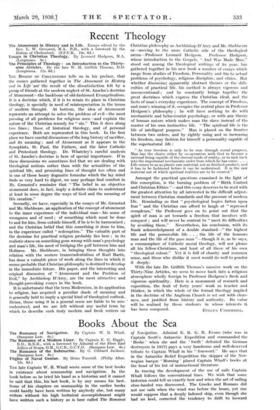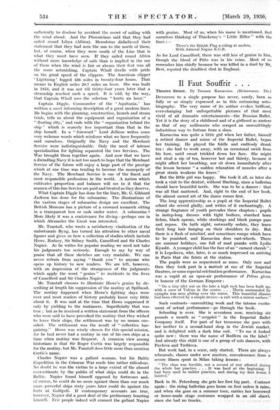Books About the Sea
TnE late Captain W. B. Whall wrote some of the best books in existence about seamanship and navigation. In the book before us he tried his hand as a historian and it cannot be said that this, his last book, is by 'any means his best. Some of his chapters on seamanship in the earlier books could hardly have been written by anybody else, but many writers without his high technical accomplishment might have written such a history as is here called The Romance of Navigation. Admiral E. R. G. R. Evans (who was in Captain Scott's Antarctic Expedition and commanded the ` Broke' when she and the ' Swift' defeated the German destroyers in 1917) pays a very handsome and well-deserved tribute to Captain Whall in his " foreword." He says that in the Antarctic Relief Expedition the skipper of the Nor- wegian barque ` Morning' placed Captain Whall's books at the head of his list of instructional literature.
In tracing the development of the use of sails Captain Whall follows the conventional lines. We wish that some historian could tell us exactly how and when the art of sailing close-hauled was discovered. The Greeks and Romans did not use sails when the wind was before the beam, yet one would suppose that a deeply ladened ship, even though she had no keel, corrected the tendency to drift to leeward sufficiently to disclose by accident the secret of sailing with the wind ahead. And the Phoenicians said that they had
sailed round Libya (Africa). Herodotus disbelieVed their statement that they had seen-the sun to the north of them, but, of course, when they were south of the Line that is what they must have seen. If they sailed round Africa without more knowledge of sails than is implied in the use- of them when the wind is fair or abeam their feat was all the more astonishing. Captain Whall dwells with pride on the great speed of the clippers. The American clipper ' Lightning ' logged 436 miles in twenty-four hours. That means in English miles 20.7 miles an hour. She was built in 1854, and it was not till thirty-four years later that a steamship reached such a speed. It is odd, by the way,- that Captain Whall uses the solecism " knots an hour."
Captain Diggle, Commander of the Aquitania,' has written a most informing description of a great modem liner. He begins with the planning, construction, launch and steam trials, tells us about the equipment and organization of a " floating city," and ends with the " organization behind the ship " which is scarcely less important than that in the ship herself. In a " foreword " Lord Jellicoe writes some very welcome words which reinforce what we have frequently said ourselves. Originally the Navy and the Merchant Service were indistinguishable. Only the need of intense specialization for fighting separated the two Services. The War brought them together again. And now that we have a dwindling Navy it is not too much to hope that the Merchant Service of the future will enjoy a large part of the prestige which at one time was tending to become the monopoly of the Navy. The Merchant Service is one of the finest and most responsible professions in the world. A nation which cultivates proportion and balance will see to it that the seamen of this fine Service are paid and treated as they deserve.
What Captain Diggle has done for the liner, Mr. G. Gibbard Jackson has done for the submarine. The illustrations of the various stages of submarine design are excellent. The British Museum has a picture of a crowned monarch sitting in a transparent box or cask under water. A submarine ? More likely it was a contrivance for diving—perhaps one in which Alexander the Great was interested.
Mr. Tunstall, who wrote a satisfactory vindication of the unfortunate Byng, has turned his attention to other naval figures and gives us here a collection of studies which include Howe, Rodney, Sir Sidney Smith, Camelford and Sir Charles Napier. As he writes for popular reading we need not take his judgments too seriously. Enough to say by way of praise that all these sketches are very readable. We can never refrain from saying " thank you " to anyone who opens up history to new readers. We are left, however, with an impression of the strangeness of the judgments which apply the word " genius " to incidents in the lives of Camelford and Sir Charles Napier.
Mr. Tunstall chooses to illustrate Howe's genius by de- scribing at length his suppression of the mutiny at Spithead. The mutiny happened when Howe's fighting days were over and most readers of history probably know very little about it. It was said at the time that Howe suppressed it only by yielding to the mutineers. Superficially that was true ; but as he received a written statement from the officers who were said to have provoked the mutiny that they wished to leave their ships, the settlement was by no means one- sided. The settlement was the result of " collective bar- gaining." Howe was wisely chosen for this special mission, for he had never had a mutiny in one of his own ships at a time when mutiny was frequent. A common view among historians is that Sir Roger Curtis was largely responsible for the mutiny, but Mr. Tunstall does little more than mention Curtis's name.
Charles Napier was a gallant seaman, but his Baltic Expedition in the Crimean War made him rather ridiculous. No doubt he was-the victim to a large extent of the absurd over-estimate by the public of what ships could do in the Baltic. Napier found himself opposed by fortresses and, of course, he could do no more against them than our much more powerful ships sixty years later could do against the forts at Gallipoli. If contemporary accounts are true, however, Napier did a good deal of the preliminary boasting himself. Fcw people indeed will connect the gallant Napier
with genius. Most Of us, when his name is mentioned, find ourselVes thinking of Thackeray's " Little Billee " with the
- There's the British Flag a-riding at anchor, - With Admiral Napier K.C.B.
As for Lord Camelford, there was still less of 'genius in him, though the blood of Pitts was in his veins. Most of us remember him chiefly because he was killed in a duel by Mr, Best, reputed the deadliest shot in England.















































 Previous page
Previous page